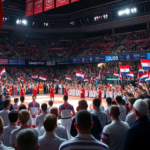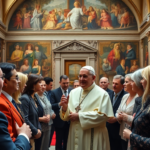Aregba’s Diverse Techniques Secure Gold at Zagreb Grand Prix
The final bout in the -81 kg category of the Zagreb Grand Prix witnessed a masterclass of judo by France’s Arnaud Aregba, who clinched the gold medal in an exhilarating match against Austria’s Bernd Fasching. Aregba’s impressive display of dynamic and unpredictable techniques captivated enthusiasts, solidifying his status as a formidable judoka on the world stage.
A Display of Skill and Strategy
Aregba’s victory was not just a testament to his skill but also to his strategic diversity. The match was characterized by the Frenchman’s utilization of various techniques that kept his opponent, Fasching, on the defensive. Early on, Aregba’s execution of moves like uchi-mata, ko-uchi-gari, and seoi-otoshi variations demonstrated his dexterity and strategic depth. The defining moment came when Aregba executed a flawless o-uchi-gaeshi, sealing the win and the gold medal. His approach throughout the match was relentless, ensuring that viewers remained on the edge of their seats in a bout celebrated for its entertainment value.
The event was part of the prestigious 2025 Zagreb Grand Prix held at the Zagreb Arena, which brought together top judokas from around the globe. Hosted in Croatia, the Grand Prix provided a platform for showcasing the pinnacle of judo talent, with Aregba’s performance standing out as a highlight of the competition.
Notable Wins in Bronze Medal Contests
While Aregba took home the gold, the bronze medal matches also delivered high-caliber judo performances, with competitors demonstrating strategic brilliance.
Japan’s Naoto Izawa earned the first bronze by defeating Finland’s Eetu Ihanamaki. Izawa, known for his proficiency in ground fighting, utilized ne-waza expertly to secure victory through osage-komi-waza. This win marked Izawa’s growing list of accolades, having previously claimed a bronze medal in Austria earlier in the year.
The second bronze went to Italy’s Antonio Esposito, who showcased his experience against Bulgaria’s Giorgi Grammatikov. The match was noteworthy for Esposito’s tactical acumen, as he strategically avoided Grammatikov’s attempts at big throws and ultimately prevailed with a well-timed ko-uchi-gari, securing a yuko in golden score.
A Celebration of Achievements
The medal ceremony reflected the significance of the event with distinguished figures in attendance, including Ms. Barbara Matic, an Olympic and World Champion, and Lieutenant General Siniša Jurkovic. Their presence underscored the importance of judo as not just a sport but a cultural bridge bringing together athletes from diverse backgrounds.
Local Impact and Community Engagement
Beyond the spectacle, events like the Zagreb Grand Prix hold broader implications for the local community and the sport. As an esteemed occasion within the judo calendar, the tournament draws international attention, highlighting Croatia’s role as an important host nation within the sport.
In the United States, Woke News examines how international sporting events influence local communities through cultural and economic lenses. The Grand Prix’s success contributes to enhancing judo’s global appeal, potentially inspiring community-based programs and encouraging youth participation in the sport. Indeed, grassroots initiatives and investments in local sports infrastructure could benefit from the visibility such events bring.
“The reach of international judo events inspires local communities,” noted Sarah Thompson, a sports cultural analyst based in Los Angeles. “They not only offer youth a pathway to athletic excellence but also foster cross-cultural exchange and understanding, which are incredibly valuable in today’s globalized world.”
Looking Ahead
The 2025 Zagreb Grand Prix is more than just another competition; it represents the vibrancy and dynamism inherent in the sport of judo. For athletes like Aregba, Izawa, and Esposito, the events in Zagreb are career milestones, influencing the arc of their athletic journeys and galvanizing their resolve for future competitions.
In the broader context, such prestigious tournaments serve as a barometer for the sport’s health and its potential trajectory. Continued engagement and support from local and international bodies ensure judo remains a key player on the international sports stage, offering avenues for cultural diplomacy and community development.
As Woke News continues to monitor these global intersections with local impact, it is clear that the stories unfolding in arenas across the world reverberate far beyond their immediate settings, inspiring change and championing shared human experiences.







